-ate (to do)
(Latin: a suffix; to do, to make, to cause, or to act upon; to do something with)
abbreviate (uh BREE vi ayt) (verb), abbreviates; abbreviated; abbreviating
1. To shorten a word by leaving out some of its letters or sounds: Jonathan decided he would be abbreviating his name to "Jon".
2. To shorten a piece of text by cutting out sections or paraphrasing it, as in abridging or shortening: The speaker abbreviated his lecture so the audience could go home before the thunderstorm started.
3. Etymology: the -brev- in abbreviate, abbreviates, etc. came from Latin brevis, meaning "short", which is also the source of the word brief; therefore, abbreviate means "to make briefer, to make shorter" by combining or omitting elements of the contents of a verbal or a written message.
2. To shorten a piece of text by cutting out sections or paraphrasing it, as in abridging or shortening: The speaker abbreviated his lecture so the audience could go home before the thunderstorm started.
3. Etymology: the -brev- in abbreviate, abbreviates, etc. came from Latin brevis, meaning "short", which is also the source of the word brief; therefore, abbreviate means "to make briefer, to make shorter" by combining or omitting elements of the contents of a verbal or a written message.
abnegate (verb), abnegates; abnegated; abnegating
1. To give up or to surrender: The King abnegated his throne to his son.
2. To deny something to oneself; to restrain, especially from indulging in some pleasure: The minister of the church abnegated the material luxuries of life.
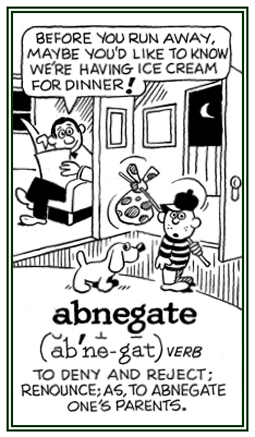
© ALL rights are reserved.

© ALL rights are reserved.
Go to this Word A Day Revisited Index
2. To deny something to oneself; to restrain, especially from indulging in some pleasure: The minister of the church abnegated the material luxuries of life.
When Agnes Marcia became a nun after the deaths of her son and husband in an auto accident, she was abnegating a life of comfort and ease in order to dedicate her life to God.
Indulging in an ice cream sundae abnegates the healthful effects of having a salad for lunch.
Because Lucy wants to lose weight, she is abnegating the consumption of so much food during her meals.


Go to this Word A Day Revisited Index
so you can see more of Mickey Bach's cartoons.
accelerative (adjective)
Tending to increase velocity or speed.
accentuate (verb), accentuates; accentuated; accentuating
1. To make a feature of something more noticeable: The company administrators were convinced that the newspaper article accentuated and emphasized the positive aspects of their financial investments.
2. To emphasize a syllable, word, or phrase when saying it: When Mary spoke, she tended to accentuate her words with French pronunciations.
3. Etymology: known from 1731, from Medieval Latin (written and spoken from 700 to 1500) accentuatus, past participle of accentuare, "to accent", from Latin accentus, "song added to speech"; from ad-, "to" + cantus, "a singing"; past participle of canere, "to sing".
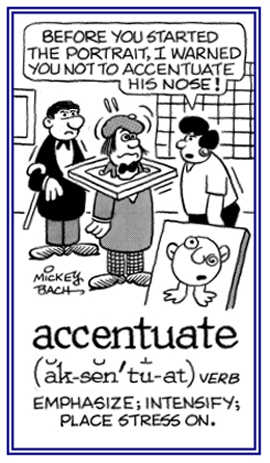
© ALL rights are reserved.
Go to this Word A Day Revisited Index
2. To emphasize a syllable, word, or phrase when saying it: When Mary spoke, she tended to accentuate her words with French pronunciations.
3. Etymology: known from 1731, from Medieval Latin (written and spoken from 700 to 1500) accentuatus, past participle of accentuare, "to accent", from Latin accentus, "song added to speech"; from ad-, "to" + cantus, "a singing"; past participle of canere, "to sing".

Go to this Word A Day Revisited Index
so you can see more of Mickey Bach's cartoons.
accurate (adjective), more accurate, most accurate
1. Giving a correct, or truthful, representation of something: "Jim's account of what happened yesterday was not accurate."
2. That which is precise or free from errors and done with care: "Mary made an accurate report about the business transaction."
3. Capable of providing information in accordance with an accepted standard: "The radio-controlled watch provides the most accurate time that one can have."
4. Etymology: from Latin cura, "care"; and accurare means "to take care of".
2. That which is precise or free from errors and done with care: "Mary made an accurate report about the business transaction."
3. Capable of providing information in accordance with an accepted standard: "The radio-controlled watch provides the most accurate time that one can have."
4. Etymology: from Latin cura, "care"; and accurare means "to take care of".
The past participle accuratus means "done with care", and from it we have the word accurate.
1. A salt or ester of acetic acid: Some firms link a succinate molecule or acetate to Vitamin E to make it stable.
2. Cellulose acetate or any of various products: A floppy disk platter, being thin, were made of acetate plastic.
2. Cellulose acetate or any of various products: A floppy disk platter, being thin, were made of acetate plastic.
Caution should be used when wearing clothing with fibres containing blends of acetate.
adjudicate (uh JOO di kayt") (verb), adjudicates; adjudicated; adjudicating
1. In law, to hear, to settle, and to decide a legal case or to reach a judicial conclusion about something: After hearing both sides of the divorce case involving the children, the judge adjudicated the matter and gave the mother full custody of her offspring.
2. To make an official judgement about a problem or a dispute in a law case: The two families were constantly arguing about the fence along their property lines causing them to go to court. The judge adjudicated the conflict and ordered the fence to be taken down.
3. Etymology: from Latin ad-, "to" + judicare, "to judge".
2. To make an official judgement about a problem or a dispute in a law case: The two families were constantly arguing about the fence along their property lines causing them to go to court. The judge adjudicated the conflict and ordered the fence to be taken down.
3. Etymology: from Latin ad-, "to" + judicare, "to judge".
adulterate (verb), adulterates; adulterated; adulterating
1. To corrupt, debase, or make impure by adding a foreign or inferior substance; often by replacing valuable ingredients with inferior ones; mixed with impurities: A restaurant was accused of adulterating their wine with water.
There are those who adulterate coffee with ground acorns or have silver debased or adulterated with copper.
3. Etymology: "to corrupt" from Latin adulteratus, past participle of adulterare, "to falsify, to corrupt"; from alterare, "to change, to alter".
aerate (verb), aerates; aerated; aerating
1. To expose a substance to air or another gas: Air can aerate a liquid substance, or air can aerate the soil when digging into the ground and turning over parts of it.
2. To provide oxygen by the procedure of respiration: Blood is aerated by oxygen in an individual's body.
3. To change or treat with air or a gas: To make soda or carbonated water, it is aerated with gas.
2. To provide oxygen by the procedure of respiration: Blood is aerated by oxygen in an individual's body.
3. To change or treat with air or a gas: To make soda or carbonated water, it is aerated with gas.
affectionate
alkylate
alleviate (verb), alleviates; alleviated; alleviating
1. To make something, like pain or hardship, more bearable or less severe: The injection the doctor gave Susan was intended to alleviate the pain caused by her infected tooth.
2. To make easier to endure; to lessen; to mitigate: Jim found that by keeping busy it helped to alleviate his sadness that was caused by the death of his lovable dog.
3. From Late Latin alleviatus, past participle of alleviare "to lighten", from Latin ad-, "to" plus levis, "light (in weight)".
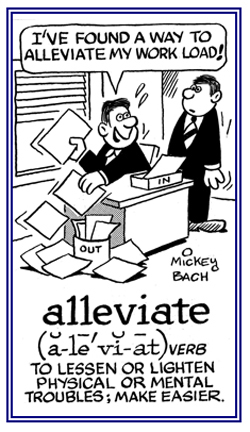
© ALL rights are reserved.
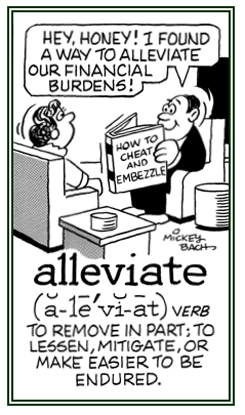
© ALL rights are reserved.
Go to this Word A Day Revisited Index
2. To make easier to endure; to lessen; to mitigate: Jim found that by keeping busy it helped to alleviate his sadness that was caused by the death of his lovable dog.
3. From Late Latin alleviatus, past participle of alleviare "to lighten", from Latin ad-, "to" plus levis, "light (in weight)".


Go to this Word A Day Revisited Index
for a list of additional Mickey Bach illustrations.
allocate (AL uh kayt") (verb), allocates; allocated; allocating
1. To set something aside for a reason or a purpose: The principal of the school allocated two teachers and three students to plan the end-of-school activities.
2. To distribute something according to a plan: The government agency announced a plan to allocate millions of dollars to purchase food supplies and medications for the storm-hit community.
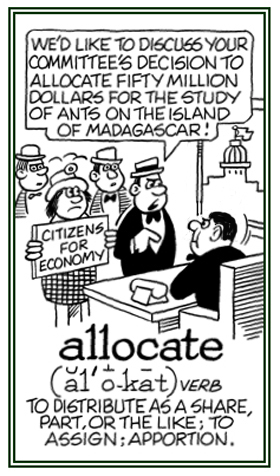
© ALL rights are reserved.
Go to this Word A Day Revisited Index
2. To distribute something according to a plan: The government agency announced a plan to allocate millions of dollars to purchase food supplies and medications for the storm-hit community.

Go to this Word A Day Revisited Index
for a list of additional Mickey Bach illustrations.
1. An individual who takes the place of another person; a backup: Hank attended the political convention not as a full delegate but as an alternate.
2. Someone who temporarily fulfills certain jobs and functions: In school when a teacher is sick and cannot teach, there is always an alternate, or a substitute teacher to fill in that day.
3. An understudy for a role: Judy was the alternate in the drama in case the person playing the part got sick and couldn't perform.
2. Someone who temporarily fulfills certain jobs and functions: In school when a teacher is sick and cannot teach, there is always an alternate, or a substitute teacher to fill in that day.
3. An understudy for a role: Judy was the alternate in the drama in case the person playing the part got sick and couldn't perform.
aluminate
A compound formed from the hydrate of aluminium by the substitution of a metal for the hydrogen.

